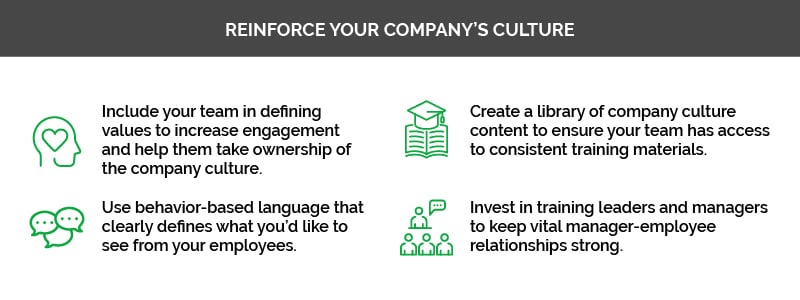How to Reinforce Your Company’s Culture and Protect It as You Scale

When you founded your business, you had a vision for the company culture you’d create. Here’s how to reinforce and protect it as you scale, so you can stay true to your vision while still experiencing growth.

There’s never been a better time to be a founder. Many businesses have been able to scale rapidly over the last few years, achieving what’s known as “hypergrowth.” Hypergrowth refers to the steep part of the S-curve, showing a dramatic pace. It means rapid expansion on all fronts for a business – including employee counts.
Fast growth and rapid acquisition of employees often comes with unintentional changes. The turnover rate in sales is high at 34%, and one in ten companies report a turnover rate of 55% or more. Employee turnover is extremely costly for businesses, and it takes a drastic toll on company culture.
It’s difficult to maintain a consistent culture when employee turnover is high or it feels like there’s a constant stream of new faces coming in to keep up with growing business demands. It’s important for all companies to ensure they’re hiring the right people, but it’s even more essential for those that are scaling. Businesses need systems to sustain their growth or risk organizational chaos and fall out.
Keep reading for tips on how to reinforce your company culture and protect it as you scale.
Include your team in defining your core values
Communication is one of the most important aspects of engagement in the workplace. A 2019 Dynamic Signal survey found that nearly two-thirds of employees considered quitting their jobs based on lack of communication alone. Those who reported good communication and transparency with their organizations had higher engagement and productivity, which translates to higher profits.
One way to increase communication around company culture is to invite employees to be part of the conversation. Allow your team to help define the culture by asking questions such as:
- What are the principles the company should uphold?
- What are the values they should abide by as employees?
- How can they collectively put them into action?
This conversation will help employees feel invested in a culture that’s being created as a collaborative process. They’ll then be more inclined to take ownership of and pride in what they will be embodying on a daily basis.
Use clear, behavior-based language
When you’re outlining company culture, it’s important to avoid ambiguous terms and language. One example that’s likely found in manifestos worldwide is some variation of “Respect each other,” but what does that even mean? What does respect look like if you defined it in clearly observable behaviors?
Use language that allows you to easily tell whether an objective has been met. An organization may choose to define “respect” as “Everyone’s ideas have the right to be heard equally,” for example, or that “No one should be discriminated against.”
This creates operational definitions for your employees, ensuring that everyone is on the same page. It also avoids abstract values, and instead presents ideas that are more concrete in nature.
Create a library of company culture content
You unfortunately can’t clone yourself, or you undoubtedly would have by now. There’s no way to personally train each employee that’s hired in a fast-growing company. Group training is more efficient, but is still time-consuming. You could train someone to train new hires, although that’s ultimately like playing a game of telephone.
You can avoid this and protect the culture you set out to create by memorializing your training in a digital company culture content library. This ensures all employees are uniformly trained, by you, and with consistent materials, plus enables you to update the training as needed. Research shows that blended learning can even be more effective than in-person training, so a self-paced, digitally accessible library will ensure your team has various modalities available from which to learn for maximum efficacy.
Invest in training and development for leadership roles
Training your company’s leaders and managers is of utmost importance. Leaders should be modeling the company culture and values through their behavior. These employees are not only critical for scaling sales, but crucial for creating a consistent work environment. Here are a few facts to keep in mind:
- Developing leaders is an invaluable tool, as studies show employees tend to learn vicariously.
- Proper training is one of the single-most important factors in what makes successful leaders and managers.
- A 2018 Udemy study on employee retention found nearly two-thirds of employees said they felt their managers lacked proper training.
- Many companies don’t budget appropriately for leadership and sales management training.
- One survey on sales management training found 41% of respondent companies had allocated zero budget for sales manager training.
- While 59% did allocate some type of budget, it was for general management -- not for leading a sales team.
- The lack of proper training at the managerial level appears to have a direct impact on the sales industry’s high turnover rates, too.
- One survey found 60% to 80% of sales reps who left a position reported doing so due to lacking connection with their leadership or feeling leadership was incompetent.
How leaders and managers are trained has a big impact on their ability to positively influence employee behaviors. Training a leadership team to use an evidence-based, strengths-focused approach to shape behavior will increase employee engagement, and create a company culture that your employees will be happy to uphold.
Let us help you scale your business
At MetaGrowth Ventures, we proudly deliver massive growth with minimal investment so you can ditch the daily grind of “founder selling.” Instead, you get an amazing team of dedicated sales professionals to do your selling for you! Josh Hirsch and Joe Arioto, our co-founders, put their combined 30,000 hours of coaching and consulting expertise to work for you, giving your company solutions-based sales consulting that will help free up your time to focus on what really matters: your growth strategy.
If you want to build your own world-class sales group without a ton of time, headaches, or hassles, contact us today. We can’t wait to help you build a dream team to start boosting your sales.
Written by
Joe Arioto
